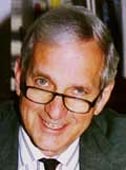Richard Reznick's Metabolic Surgery Network and Other Co-ordinated Departmental Programs

Martin McKneally
|
In my report on bariatric surgery in the last issue,
I neglected an important foundational
point. Richard Reznick
brought the surgical community
and the Ontario government
together in 2009 to establish a
coordinated Bariatric Surgery program. Patients enter
the program through the registry (http://www.bariatricregistry.ca/
default.aspx). They are interviewed at one of
the Network's assessment centers. There they are carefully
evaluated by a team of dietitians, psychiatrists and
nurse practitioners, and prepared for surgical treatment.
Surgery is performed in dedicated treatment centers in the
network. As Teodor Grantcharov (see article in this issue)
describes it, "the hospitals work not as isolated units, but as
part of a well-coordinated program put in place by Richard
Reznick. He is an amazing leader who brought everyone
to the table, including the government, and solved the
problems that arose when Ontario was sending patients to
the United States for bariatric surgery. Those patients did
not do well because they did not have a total program of
diet, psychiatry and other supports. Surgery is an important
part, but the multi-disciplinary program is essential.
Richard is doing the same thing in Kingston. His leadership
made Toronto a world centre for surgical education
and is now doing the same with bariatric surgery. Bariatric
surgery two decades ago was regarded as weird and questionable.
Now it is regarded as a wonderful advance."
Networked programs offer synergistic use of clinical
and research resources, enhance the academic impact of
our department's members, and provide patients with a
sense of order and purposefulness in an often bewildering
healthcare environment. The trauma program and the
spine program (http://www.surgicalspotlight.ca/Article.aspx?
ver=Fall_2008&f=Announcements) are examples of
the collaborative model of healthcare delivery. Similarly,
the Surgeon Scientist program attracts scholars to our
department because it is coordinated and harmonized
with clinical training, not simply a collection of unrelated
laboratories, competing investigators, and unplanned
interruptions to pursue research questions.
|
I recently had the opportunity to address my classmates
at Cornell's 50th year medical school reunion. Their
moral distress at the state of the competitive, entrepreneurial
practice of medicine and surgery in the US was
palpable – expressed as reluctance to encourage their
grandchildren to pursue a medical career. They were competing
for patients, and with insurers. "We only accept
cash" one surgeon from the wealthiest county in the US
told me. My classmates were surprised by the experience I
was able to describe as a surgeon in our Department.
A colleague from New York University related the
effects of the competitive, entrepreneurial non-system
of care when hurricane Sandy flooded lower Manhattan.
"The power was knocked out in our hospitals (Langone,
Bellevue, and the Manhattan VA). Carrying the patients
down 25 floors by flashlight with no loss of life was a lot
easier than getting them accepted at the other hospitals.
They bickered about taking uninsured and Medicaid
patients despite the crisis."
Our Department, meanwhile, is moving onward and
upward as we add new faculty and new residents, and
embark on an ambitious next strategic plan. Visitors,
accreditors and other external reviewers are impressed by
the energy and accomplishments of our surgeons, residents,
scientists, students and staff. We wish all of them and all our
readers a cheerful and healthful holiday with friends and
family, and look forward to a productive new year together.
M.M.
SURGICAL ETHICS COURSE
The University of Toronto Department of Surgery
will present a one day Surgical Ethics Course at
the Rim Rock Hotel in Banff, Alberta on May
28, 2013, immediately preceding the Canadian
Bioethics Society annual meeting. The course will
focus on surgical Innovation, life sustaining treatment,
and recent developments in organ donation.
For information on registration contact martin.mckneally@utoronto.ca
|
|